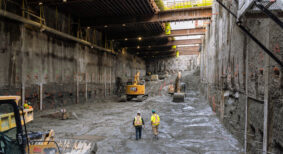Risks and challenges are nothing new for the B.C. construction industry. As the COVID-19 pandemic continues to wreak havoc on businesses and daily lives, the industry will need to rely on its diversity, resiliency and innovation more than ever to soften the economic blow of the global health crisis.
Due to the often dangerous working conditions in the industrial, commercial, and institutional (ICI) sector, construction sites already have strict safety protocols in place. This has made it somewhat easier for companies to respond and implement new best practices to combat the novel coronavirus.
“The construction industry is resilient and used to managing risk. COVID-19 will challenge us, but we will work together and we will come through it,” said Chris Atchison, president of the B.C. Construction Association. “With construction contributing just under 10 per cent of provincial GDP, the sector is absolutely essential to the economic health of our province.”
The B.C. government has defined the construction industry as an essential service, so jobsites are allowed to remain open as long as the required COVID-19 health and safety precautions are followed. Because the health threat could last months, many in the industry are rising to the challenge and finding innovative ways to comply.
“Our sites remain operational and we have taken all the necessary steps to be compliant with the orders from the provincial health officer,” says Mike Maierle, principal and founder of ETRO Construction. “We’ve been monitoring the situation closely from the beginning and have been very proactive in taking the necessary actions to keep our people safe.”
Some of the measures ETRO have taken include physical distancing rules, additional signage, additional hand washing stations and a digital screening questionnaire prior to any worker entering jobsites.
“Because we are a Gsuite company and we have a thoughtfully implemented tech stack, the transition has been seamless and we have been able to stay connected and productive,” says Maierle.
While construction is allowed to continue, some projects are being put on hold or delayed as a result of the pandemic.
“We anticipate further impact to current projects as we implement physical distancing requirements and limit resources on site. In regards to supply chain issues, we are just beginning to feel the effects and it will be a challenge for months to come,” says Maierle.
At LMS Reinforcing Steel Group, work is continuing but most projects have slowed down schedules to accommodate for less workers on site. Rebar supply is not currently an issue, according to Norm Streu, LMS president and chief operating officer.
“The industry in B.C. has done a good job in coordinating an approach to safe procedures on sites. There has been broad sharing of best practices among all parties, and good communication. All parties have understood that safety of the workers is the top priority, not short term schedule objectives,” says Streu.
Wales McLelland Construction has implemented all Health Canada recommendations to reduce the potential risk to employees, vendors, and associates.
“Our employees are embracing the changing work environment,” says Kevin Armon, Wales vice president of construction. “Yes, working conditions are challenging, but our people remain positive and focused, and approach each day with intention and ambition.”
All of Wales’ construction sites are open with work progressing on schedule, while adhering to recommended upgraded sanitation, monitoring of personnel, and practical separation protocols.
“We are sharing lessons learned, innovations, and success stories across our job sites. We are also providing weekly video updates to our clients to keep them updated on the status of current projects,” said Wales president Doug Scott.
He adds, “The investment our clients make in their projects is significant. Delays are costly and disruptive, and we are fortunate to have a strong network of suppliers and subcontractors who are committed to supporting each other and our clients through this crisis.”
While much of the economy is grinding to a halt due to the pandemic, construction offers some optimism. The construction sector is one of Canada’s largest employers and will be a major contributor to the country’s economic recovery. The industry, 70 per cent which are small and medium-sized business, employs more than 1.5 million Canadians and contributes 7 per cent of Canada’s Gross Domestic Product.
In B.C., construction is a $16 billion dollar industry, and over the past decade has consistently been one of the fastest growing sectors. Construction supports many critical sectors such as transportation, water, and healthcare. Development applications continue to be processed and reviewed by municipalities to stimulate the local economy and create jobs, helping to ensure the industry keeps operating during this challenging time.
“B.C.’s construction industry is in the privileged position of being defined as an essential service,” says Fiona Famulak, president of the Vancouver Regional Association. “As the largest employer in the goods and services sector, the health and safety of our workers continues to be our No. 1 priority; we are ready and able to implement enhanced safety protocols that will keep our workers safe and employed; and we own our collective responsibility to help position B.C. for economic recovery.”
The construction industry is also doing their part to support communities and healthcare providers during the COVID-19 crisis. In-demand equipment, routinely used in construction including n95-rated masks and eye protection, have been collected by members and donated. At #CDNConstructionGives, there are hundreds of examples of how the industry is making a difference from food banks to pet shelters.
ETRO Construction is giving back and supporting the community in any way possible including volunteering with Meals on Wheels.
“We have reached out to the Health and Home Care Society of BC and are in the process of having our team volunteer with Meals on Wheels. Meals on Wheels typically provides meals to 500 people per day and because of COVID-19 they have had to reduce this to about 200. They are in desperate need of volunteers and we want to do our part to support the vulnerable people in our society during this time,” says Maierle.
Cheryl Mah is managing editor of Construction Business. For more COVID-19 coverage, visit here.










The way you discussed the topic with ease and completeness is really amazing. Thanks for this article!